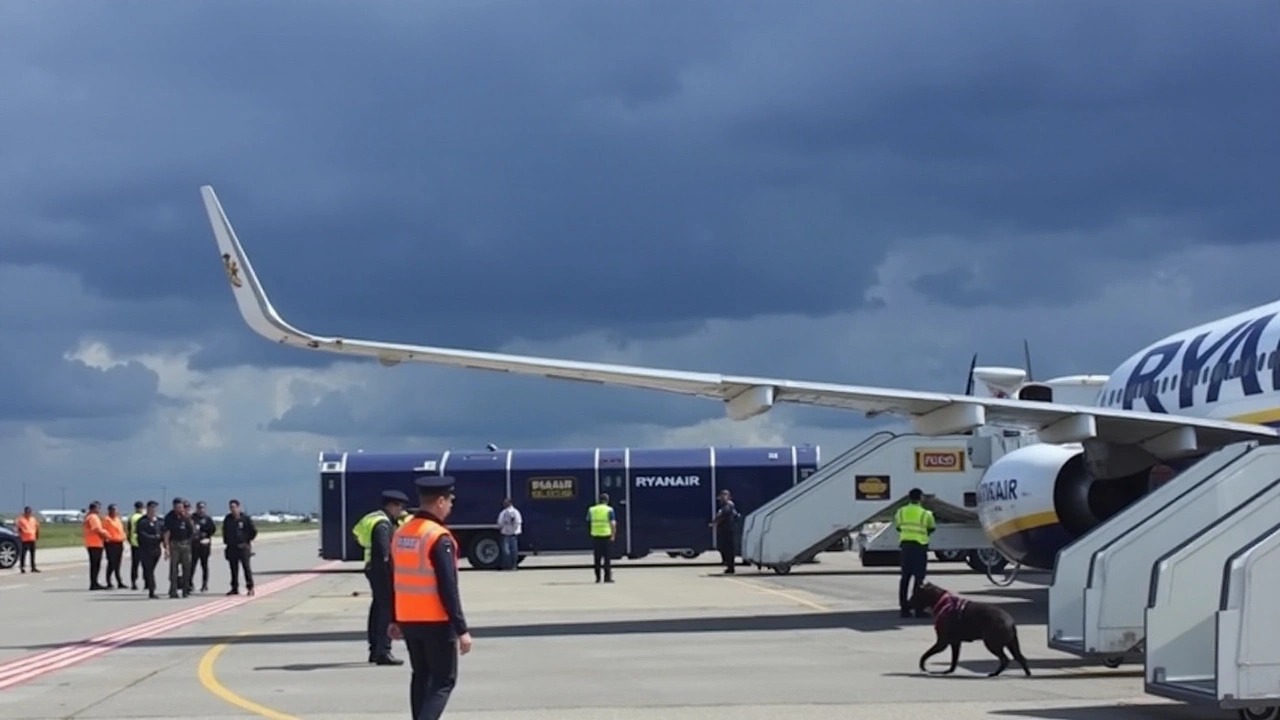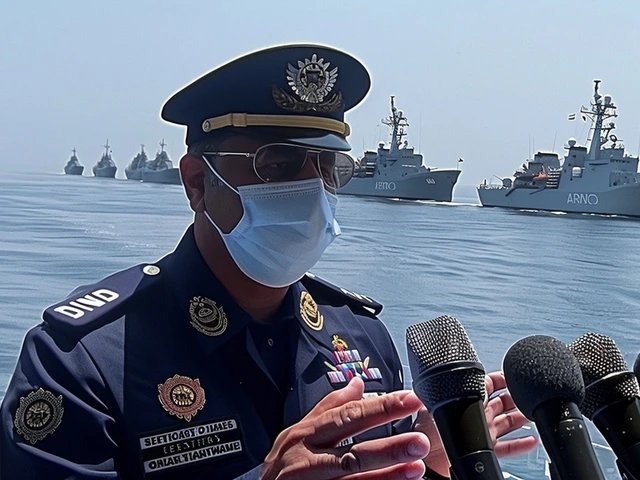Poland Charges 3 Belarusians for Forcing Plane Diversion to Minsk in 2021 Incident
In a significant development that underscores the ongoing friction between Belarus and the European Union, Poland has laid charges against three Belarusian nationals for their roles in the forced diversion of a Ryanair flight to Minsk in 2021. The incident, which unfolded on May 23, 2021, captured global headlines and drew swift condemnation from international leaders, primarily from the European Union. The diversion was executed under a false pretense of a bomb threat, effectively transforming a routine commercial flight into an international diplomatic crisis.
The Incident Involving Ryanair Flight FR4978
The Ryanair flight in question, designated as FR4978, was en route from Athens, Greece, to Vilnius, Lithuania, carrying numerous passengers, including Roman Protasevich, a well-known opposition journalist and a vocal critic of Belarusian President Alexander Lukashenko. Accompanied by his girlfriend, Sofia Sapega, Protasevich was targeted by Belarusian authorities for his dissident activities. The false bomb threat that forced the plane to land in Minsk was subsequently revealed as a calculated move to arrest Protasevich.
Upon landing in Minsk, Protasevich and Sapega were detained by Belarusian security forces, sparking a widespread outcry from European leaders. Terms like 'hijacking' and 'state-sponsored piracy' were used by many to describe the Belarusian authorities' actions, with calls for immediate sanctions and responses reverberating across the EU.
Repercussions and European Union Response
The forced diversion entrenched existing tensions between Belarus and Western nations, prompting immediate punitive measures from the European Union. The EU quickly imposed sanctions on Belarus, targeting officials and entities linked to the incident. These sanctions aimed to demonstrate the EU's staunch opposition to what it viewed as unacceptable acts of state-sponsored coercion and suppression of dissent.
As the world watched the drama unfold, the message was clear: the international community would not stand idly by while basic principles of aviation safety and political freedom were trampled. The incident also reignited discussions about the lengths to which authoritarian regimes might go to silence political opponents and exert control over their citizens.
Charges Brought Forward by Polish Authorities
Polish authorities, determined to seek justice and accountability, have charged the three Belarusian individuals involved with hijacking an aircraft and making a false bomb threat. These charges underscore Poland's commitment to holding those responsible for undermining aviation security and international law accountable for their actions.
For Poland, a country that has historically advocated for democratic values and human rights, particularly in the context of Eastern European politics, this legal step is both a symbolic and practical measure. It is aimed at ensuring that such blatant violations of international norms do not go unpunished and serve as a deterrent to any future attempts by state actors to engage in similar tactics.
Roman Protasevich's Arrest and Global Repercussion
The arrest of Roman Protasevich and Sofia Sapega remains a poignant reminder of the risks faced by journalists and political activists operating under repressive regimes. Protasevich, a former editor of the influential NEXTA Telegram channel, had been a prominent figure in organizing and reporting on anti-Lukashenko demonstrations. His detention symbolizes the broader crackdown on freedom of expression and the press in Belarus, eliciting solidarity and support from international human rights organizations.
Protasevich's plight, combined with the boldness of the plane's forced diversion, has bolstered calls for stronger international mechanisms to protect journalists and safeguard the principles of free speech. Human rights advocates argue that the global community must enhance efforts to shield dissenting voices from persecution, ensuring that political asylum and protective measures are accessible to those under threat.
Sanctions and Diplomatic Fallout
The sanctions imposed by the European Union following the incident included travel bans, asset freezes, and restrictions on business activities for several Belarusian officials and entities. These measures were part of a coordinated strategy to pressure the Belarusian government into changing its oppressive policies and releasing political prisoners. However, these sanctions also contributed to an escalation in diplomatic tensions between Belarus and Western nations.
Belarusian authorities, for their part, have dismissed the allegations and rebuffed the sanctions as unwarranted interference in their domestic affairs. President Lukashenko, in various public statements, has framed the international response as part of a broader geopolitical struggle, positioning Belarus as a victim of Western antagonism. This narrative has been leveraged to bolster domestic support and justify continued crackdowns on dissent.
The Broader Context and Implications
The Ryanair incident is not an isolated episode but part of a more extensive pattern of behavior by the Belarusian government. Under President Lukashenko's rule, Belarus has faced numerous allegations of human rights abuses, electoral fraud, and suppression of opposition. The controversial 2020 presidential election, which saw Lukashenko claim a disputed victory, ignited mass protests and an intensified crackdown on political opponents, civil society, and independent media.
In this climate, the diversion of Ryanair flight FR4978 stands out as a particularly audacious act, emblematic of the lengths to which the Lukashenko regime will go to maintain its grip on power. For the international community, it serves as a stark reminder of the importance of upholding democratic values and the rule of law, even when faced with daunting geopolitical challenges.
Ongoing Efforts for Accountability
As Poland moves forward with prosecutions, the international community continues to monitor the situation closely. Human rights organizations and advocacy groups are maintaining pressure on Belarus to release Protasevich and other political prisoners, while also calling for broader systemic reforms. The European Union, alongside other international bodies, remains committed to supporting democratic movements in Belarus and holding those responsible for human rights violations accountable.
In the face of adversity, the resolve to defend human rights and democratic principles shines through. The case of the Ryanair flight diversion to Minsk highlights the resilience of those who stand up against repression and the international solidarity that supports their cause.







Amit Agnihotri
September 6, 2024 AT 20:53Charging these individuals is a righteous step toward upholding international aviation law.
Erica Watson-Currie
September 9, 2024 AT 03:56The forced diversion reveals a paradox of power where sovereignty is weaponized against liberty.
Mark Pelletier
September 11, 2024 AT 11:00One cannot overlook the calculated audacity of a regime that pretends to protect its citizens while hijacking a commercial aircraft for political ends. The incident stands as a stark reminder that the rule of law is vulnerable when states wield their authority as a weapon. It demonstrates how international norms can be twisted to serve a narrow agenda. The ripple effects of such actions extend far beyond the passengers on that particular flight. They erode trust in the safety of civil aviation across borders. Moreover the episode underscores the importance of collective security mechanisms within the EU. It also reveals how geopolitical tensions can manifest in seemingly routine operations. The legal response by Poland adds a layer of accountability that many hoped to see sooner. By pursuing charges, Warsaw signals that state‑sponsored coercion will not go unchecked. This move may deter future attempts to replicate the Minsk diversion. It also empowers other nations to take similar legal steps. The broader context of Belarus’s human‑rights record cannot be ignored. The targeting of a journalist exemplifies the suppression of dissent. International solidarity, as expressed through sanctions, amplifies pressure on authoritarian regimes. Ultimately the world watches to see whether justice will prevail or whether such tactics will become normalized.
Cheyenne Walker
September 13, 2024 AT 18:03From a procedural standpoint, the Polish indictment aligns with established statutes on unlawful interference with civil aviation. It is essential that the charges specifically address both the false bomb threat and the subsequent hijacking of the aircraft. The legal framework provides for severe penalties, reflecting the gravity of endangering civilian lives. Moreover, successful prosecution could set a precedent for cross‑border accountability. This case also highlights the necessity for stronger international coordination on aviation security protocols. In practice, airlines and regulators must reinforce threat assessment procedures to avoid similar manipulations. Finally, the broader implications for EU‑Belarus relations underscore how legal actions can complement diplomatic sanctions.
Jo Simpkinson
September 16, 2024 AT 01:07Wow the drama never stops, Belarus pulling a fast one and the world just rolls its eyes – classic move.
Darrell Kuykendall
September 18, 2024 AT 08:10Great job Poland!!! This is exactly the kind of decisive action we need to keep the skies safe!!! Kudos to the investigators!!!
Dean Obijekwu
September 20, 2024 AT 15:14Appreciate the thorough breakdown, especially the parts about legal precedents – helpful for anyone trying to understand the bigger picture.
finlay moss
September 22, 2024 AT 22:17i think its clear that belarus tried to play chess but ended up in checkmate they cant get away with this any more
Carl Gough
September 25, 2024 AT 05:21Listen up folks, this is a bold, brazen display of state‑level bullying, and it's about time someone called it out in vivid, unapologetic terms!
Rebecca Hayes
September 27, 2024 AT 12:24From a policy analysis perspective, the incident underscores gaps in trans‑regional risk management frameworks and suggests a need for enhanced inter‑agency data sharing protocols.
Jason Underhill
September 29, 2024 AT 19:28Sure, Poland’s charging move is just another bureaucratic tick‑box exercise 😒
Kirsten Wilson
October 2, 2024 AT 02:31yeah but we cant just sit there noddin it if they keep pullin these stunts
Michelle Roque
October 4, 2024 AT 09:35the whole thing is a reminder that we need stricter protocols, otherwise we keep seein this kind of nonsense
Killian Lecrut
October 6, 2024 AT 16:38Honestly, if Belarus wanted a headline, they could've just posted a meme – this was overkill.
Subi Sambi
October 8, 2024 AT 23:42Another example of how authoritarian regimes manipulate international norms for their own gain, and it's about time the world calls them out.
Joshua Rainey
October 11, 2024 AT 06:46Oh great, another drama saga – as if the EU didn't have enough to deal with already.
Gail Robb
October 13, 2024 AT 13:49While some tout this as a triumph of justice, it also raises questions about the efficacy of punitive measures versus diplomatic engagement.
Pradeep Chabdal
October 15, 2024 AT 20:53One might argue that the legal proceedings represent a sophisticated attempt to reassert the primacy of international legal order amidst a climate of geopolitical turbulence.